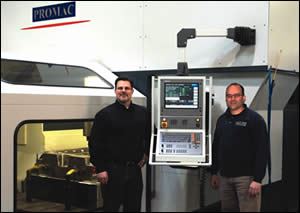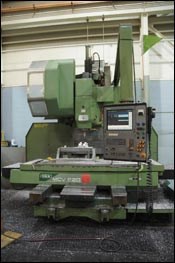Retrofits Invigorate Old Machine Tools
Retrofitting older machine tools with modern CNC, DRO and linear scales is often cheaper than buying new machines. According to two veteran retrofitters who have worked together for nearly 10 years, such retrofits can often bring outdated machines to like-new condition.
Share





When it becomes imperative in a machining business to find ways to improve production, there are always options. What is the best way to make these improvements? Is obtaining the latest advances in new equipment in order? If so, how much will that cost?
These questions are commonly asked and answered by those in the industrial machining business every day. While each situation has its own set of incidentals, some common truths must be acknowledged, according Steve Colasanti, systems integrator at Dual Electric & Refrigeration Services, and Frank Cirino, president of Lomar Machine Repair. Both companies are located in Tecumseh, Ontario.
“The cost of upgrading a machine tool to almost new is typically a fraction of the cost of buying new,” Mr. Colasanti says. “If you have a solid machine base to work with, retrofitting machines with digital CNC and servo technology can yield large decreases in cycle time while providing accuracy similar to that of new machinery.”
Both Mr. Colasanti and Mr. Cirino should know, as they have been doing just that as a team for almost ten years. “We at Lomar specialize in mechanical service work for the tool and mould industry, and the Dual guys are experts at the electrical end of things,” explains Cirino.
Together, they have participated in the successful implementation of more than 50 CNC machine retrofits plus numerous DRO and scale integrations. Both have been working with Heidenhain equipment for their entire careers. “We have many success stories that we can share and many happy customers,” Mr. Colasanti says, citing Concours Mold Inc. in Ontario as just one.
The teams’ experience with Councours Mold began in 1998, when they equipped a large vertical milling machine with a Heidenhain TNC 426 analog system. Since then, the company has called them back in to perform five other major CNC retrofits, including one involving a machine identical to the vertical mill mentioned above. Equipped with a high speed, PC-based CNC, this mill took more than 300 hours to cut a large tool—a job that its sister machine with the newly installed analog control could complete in 180 hours. The company decided to replace the PC-based control with a digital system, which reduced cut time to 110 hours—a performance increase of more than 265 percent. After that successful retrofit, Mr. Colosanti and Mr. Cirino also equipped the analog machine with a digital control.
Both say that providing a high-quality digital retrofit begins in the quoting stages. The first step is to investigate the mechanics of the machine to determine the feasibility for a digital upgrade. Proper inertia matching calculations for each axis drive system is essential to peak high speed operation. “I never trust the original manufacturer design as being accurate,” Mr. Colasanti says. Next, they must understand the electrical system and how to properly integrate to it. The goal is to provide a system with high performance and low downtime.
Talking about payback in retrofits is also important, Mr. Colasanti says. “I always tell people that when you’re busy, payback is fast. When you’re slow, payback is not as fast, but it is evident in shorter tooling production times for your customers,” he explains.
In addition, Mr. Colasanti says machine retrofits allows customers to stop farming out jobs, which can result in substantial cost savings. He cited one example in which Concours had to farm out a job that ran around-the-clock at about $100 an hour, resulting in a total cost of about $17,000 per week. After a digital retrofit, however, Concours could complete the jobs more quickly, and that money stayed in-house. The retrofit, which took about two weeks, held about a ten-week payback and resulted in long-term savings.
In addition to CNC retrofits, the two men also recommend linear scale upgrades, especially for smaller milling machines. They say they use Heidenhain components for these upgrades as well because of their ability to withstand harsh industrial environments. A typical installation in a CNC application includes proper mechanical alignment of the scale with custom-made brackets for the reader head. A 1- or 3-meter armored cable on the cable raceway connects to the CNC.
“When you start getting into longer distances, machines taking measurements using rotary encoders on the motors can lose accuracy,” Mr. Cirino says. “Ballscrew and thermal expansion issues often come into play, and using a linear scale as the measurement component instead is much more accurate.”
Mr. Colasanti and Mr. Cirino also use Heidenhain components for DRO retrofits, providing installations on knee mills, manual boring mills and rotary tables. A recent retrofit for one customer involved replacing three old DRO kits that were expensive to repair. John Morris, shop foreman, says the new Heidenhain DROs keep everything running smoothly and provide bolt-hole circle capabilities.
Read Next
Setting Up the Building Blocks for a Digital Factory
Woodward Inc. spent over a year developing an API to connect machines to its digital factory. Caron Engineering’s MiConnect has cut most of this process while also granting the shop greater access to machine information.
Read MoreRegistration Now Open for the Precision Machining Technology Show (PMTS) 2025
The precision machining industry’s premier event returns to Cleveland, OH, April 1-3.
Read More5 Rules of Thumb for Buying CNC Machine Tools
Use these tips to carefully plan your machine tool purchases and to avoid regretting your decision later.
Read More























.jpg;maxWidth=300;quality=90)






